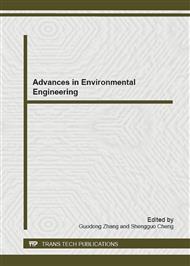p.151
p.155
p.159
p.168
p.175
p.182
p.188
p.192
p.202
Eco-Efficiency-Based Evaluation of the Resource and Environmental Performances of Jiangxi Province, China
Abstract:
From the perspective of ecological efficiency (eco-efficiency), the resource and environmental intensities and performances of Jiangxi Province, China from 2000 to 2010 were analyzed via the use of the improved resource and environmental performance index (REPI) calculation model. The results showed that: (1) with the accelerated economic development, energy consumption in Jiangxi Province increased at the same rate, whereas water consumption increased relatively slowly, and COD and SO2 emissions showed the same trends; (2) the resource consumption intensities of Jiangxi Province were markedly higher than the average levels of China. The environmental pollution intensities were also higher than those of China, including the intensity of industrial solid waste discharge in the previous year; (3) the performance indices were ranked by size in 2000 as follows: industrial solid wastes discharge > SO2 emission > energy consumption > building land consumption > COD emission > water consumption; in 2010, the ranking was as follows: energy consumption > SO2 emission > building land consumption > industrial solid wastes discharge > COD emission > water consumption.
Info:
Periodical:
Pages:
175-181
DOI:
Citation:
Online since:
November 2012
Authors:
Price:
Сopyright:
© 2012 Trans Tech Publications Ltd. All Rights Reserved
Share:
Citation:


